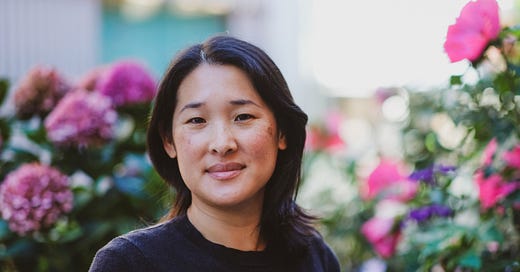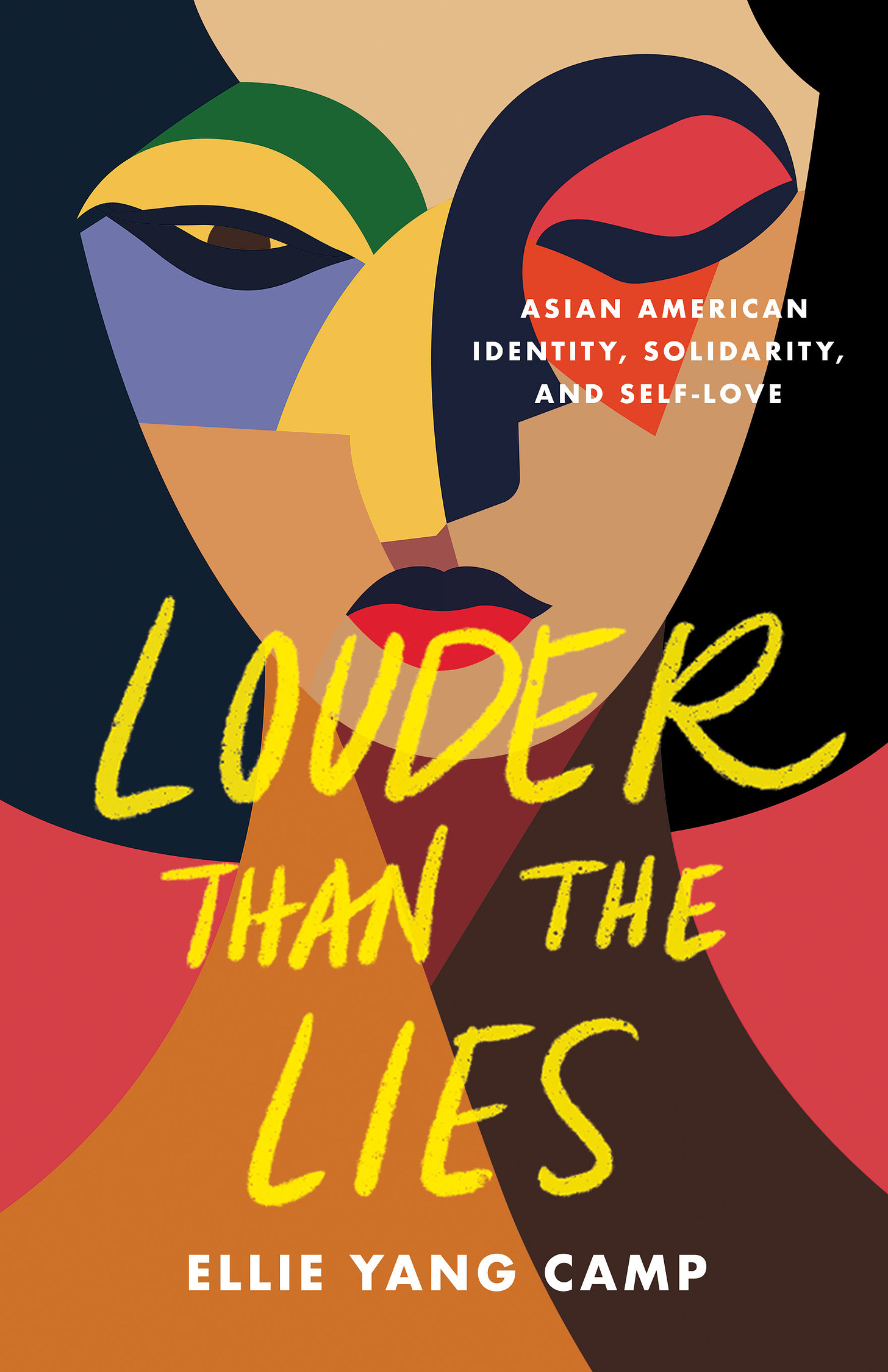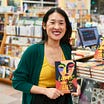Beyond the American Story You Think You Know
Ellie Yang Camp on History, Identity, and Belonging in her new book, "Louder Than the Lies"
Asian Writers’ Collective is a publication dedicated to fostering greater understanding and appreciation of Asian cultures and experiences among a global readership. Subscribe to the Asian Writer’s Collective to decolonize your reading and discover unique writing.
Ellie Yang Camp is an educator-turned-author whose journey into writing emerged from her work in anti-racism education and Asian American studies. Born in New York and raised in San Jose, California, by Taiwanese immigrant parents, Camp has made the Bay Area her lifelong home, where she now lives with her husband and two school-age children.
Ellie’s path to authorship took an unexpected turn after a decade of teaching history at Lynbrook High School, a public majority-Asian school in San Jose. Her academic foundation was built at UC Berkeley, where she earned her undergraduate degree in Political Science, followed by a master’s in Education from Stanford. After the birth of her second child, Camp stepped away from classroom teaching to focus on family life, during which time she discovered a passion for calligraphy that blossomed into a professional business.
During this time, she continued her work in anti-racism education, including collaborations with NBA star Jeremy Lin’s business team and foundation board, and participating in the Emerging Leaders of Color program through the Center for Justice + Renewal.
Since 2020, Camp has immersed herself in writing. Her debut book, Louder than the Lies, which explores Asian American history and racial justice, wasn’t part of her original career plan. The project began when a literary agent discovered her online anti-racist curriculum materials centered on Asian-American experiences.
When not writing or advocating for racial justice, Camp finds joy in creative pursuits: binding books, creating abstract art, and practicing calligraphy. While she may not aspire to be a career author, she has discovered writing to be a powerful tool for illuminating the complex narratives of identity and belonging that often feel just beyond reach.
You cover a wide range of topics, including the history of racism and white supremacy, the ways the American system is set up to keep minorities in their places, and finally, ways to shake up the system. Can you discuss what drove you to write this book?
In my experiences of teaching, being in community with other Asian Americans, and being Asian American myself, it became clear how few resources there were to help Asian Americans make sense of their own racialized experiences living in the United States. Most resources that exist are about being Black or white. I also had some personal experiences taking classes or workshops on race from other non-Asian people of color who would do a fantastic job when talking about other racialized groups, but when it came time to talk specifically about Asian American identity, it would devolve into a confusing and sometimes offensive jumble of stereotypes and ignorance. I thought Asian Americans deserved better, so I set out to write a book that would be clear, approachable, and robust for the Asian American community to help us understand our experiences in a way that was compassionate and caring.
What are your hopes for its impact on both Asian Americans and non-Asians?
For Asian Americans, I really want our lives to make more sense to us so we can be empowered to imagine better solutions for the health and safety of our communities and be a part of larger movements fighting for racial justice. For everyone, I hope it helps us see how the system of white supremacy operates more clearly, especially from the “middle,” allowing us to have more understanding of each other's experiences and expand our creativity in how we can work together to dismantle the system together.
Something you write about is the racial tensions not just between whites and Asians, but also between Asians and Blacks. From your research and experience, what are some practical ways to bridge gaps between minorities?
Because the system of white supremacy labels Asian Americans as the “model minority,” which puts us in a position more proximate to whiteness than other groups of color, we really need to get serious about unlearning our anti-Blackness. I dedicate a whole chapter to this in Louder Than the Lies where I give very practical suggestions, as well as reflect on the surprising discoveries my own journey of unlearning uncovered.
However, I do think that most of the tensions that exist between Asian and Black communities are based on misunderstanding and ignorance of each other’s histories and the system of white supremacy. So taking the time to learn about each other’s histories and experiences from each other is vital. White supremacy is very loud about filling the gaps between us with lies, constantly telling us what to think about each other. When we take the time to actually learn about each other from each other, we often find there is a lot more commonality than we expected. So it’s important to counteract these lies that we’re being fed about each other by doing our own unlearning and relearning.
Being an author is a difficult career choice, especially for underrepresented writers. What challenges have you faced, and how did you overcome them? How do you think your unique perspective contributes to the broader literary landscape?
When I first started writing the book in 2020, I had a lot of doubts about the publishing industry in general. I had heard how white and gatekeeper-y it was and I was unsure if I would find a publisher willing to publish my book for Asian American audiences about being Asian American. It wasn’t easy to sell such a “niche” book that was also “genre-bending”: integrating history, race, self-help, and a little memoir. But for me, these were non-negotiable aspects of the book if my primary goal was to make the best resource for Asian American readers as I could. So my perspective was that if no one wanted to publish it, I could always self-publish (my agent would visibly cringe when I said things like this LOL). But I think knowing I had a “Plan B” in place from the onset helped me not compromise my vision. It took some time, but my agent did eventually find the right publisher who understood the value of what I was trying to do and wanted my book for what it was, so I’m really grateful for that.
What was the research process like? Were there any surprising or unexpected discoveries or insights you had while writing?
It was quite harrowing! This book was probably twenty years in the making so it required me to mine so much of my memory, trying to remember where I had learned things. If I had known I was going to write a book, I would have kept better notes along the way!
One thing I was very intentional about was wanting to make knowledge more accessible, so when I was researching and making the reference list, I purposely looked for sources that are available online or in a book you could check out at the library. That way if readers learn about something and want to find out more, they don't need to have special access to archives or academic journals to do more exploration. It actually surprised me how much is available online, you just need to know what you’re looking for.
The other thing I didn’t expect was when my editor suggested I interview people. The original manuscript didn’t have the interviews, but she said that in a book about Asian American identity, approaching it like a journalist and adding a chorus of voices was another way to add credibility to what the book was trying to communicate. I’m glad that she made this suggestion because not only did I get to have fascinating conversations with my interviewees, but their experiences and insights really added to the openness of the book.
You write about anger within the Asian American community: because of erasure of their history, the lies they’ve been sold as part of the American Dream, and the experience of racial violence. For someone who is just starting to feel this anger for the first time, where would you point them in terms of resources or how to deal with their complicated emotions?
In activist spaces, we often talk about how anger can be a catalyzing force. It can energize and motivate you to act instead of being complacent, but anger can also be directionless. I find it’s helpful to ask what feelings are sitting underneath that anger, because anger is a secondary emotion. Am I feeling afraid because of racial violence? Disappointment that someone isn’t sharing my perspective? Resentment for being unfairly scapegoated? Betrayed because someone has become untrustworthy? Ashamed because I have been ridiculed? Embarrassed because I wish I had done things differently?
Sometimes I am feeling all of these things at the same time, so listing them out can help me feel less jumbled and I can see what I’m actually dealing with. Sometimes when we’re angry, we can do things that aren’t helpful just in an attempt to release the anger, but taking the time to untangle all the emotions helps me figure out what I’m actually angry about so I can make sure my actions are truly targeted at what I want to change.
Naming things as they are and growing in awareness can propel us toward action, as you wrote. Your book highlights many ways white supremacy has caused serious harm. What would you say to those who are just becoming aware of these realities and may feel personalised anger against white people in general?
First of all, in Chapter 8 of Louder Than the Lies, I do expand on the difference between whiteness and white people, which I highly recommend reading to understand how whiteness works in general. Secondly, I would like to emphasize that we are allowed to choose which white people we want to spend our precious time and energy on. White supremacy makes us feel obligated to keep all white people happy all the time, but we have the personal agency to decide for ourselves how we want to live our lives. But to me, this is actually a question about resentment.
In my own life, something that has helped heal a lot of the burning resentment I carried was learning to have more compassion for myself and validating my own experiences. When we experience the unfairness of the system of white supremacy, the underlying resentment we feel towards white people is often rooted in the question of But what about me? Am I not allowed to exist? The answer is yes, you are allowed to exist! But the person who needs to believe that the most is yourself. When I have taken the time and space to truly show compassion to myself and acknowledge my own experiences, it helps soften the edges of my resentment. Listening to guided self-compassion meditations or doing self-compassion exercises can be very helpful to assist this. When I’m able to make space for my own existence, I’m more able to move with understanding and generosity rather than being fueled by bitterness and resentment.
Can you tell us more about any future projects you might have in the works or plans?
Writing Louder Than the Lies was a mostly solo, intense, all-encompassing endeavor, so I’ve been yearning to slow down and do more listening, learning, and organizing with others. Now that the book is out, the conversations I’ve been having are so invigorating and I love hearing from readers how it’s challenging them and causing them to reimagine what’s possible. I’m really excited to see where other people go with it. In general, this book was not part of a major plan I had, so I’m just along for the ride to see where it leads. I don’t think I can plan out where it might take me.
Other than her Substack, the best place to connect with Ellie is Instagram. You can also find her on her website at ellieyangcamp.com. And of course, don’t forget to pick up your copy of Louder Than the Lies!












Thank you for such a meaty interview! It was a pleasure
This is a fantastic interview, so insightful, and truly inspiring — about not only the issues explored in the book, but the research and writing process as well. Thank you Ellie for sharing all this knowledge, and major gratitude to Tiffany Chu and the Asian Writers' Collective for featuring this enlightening conversation!